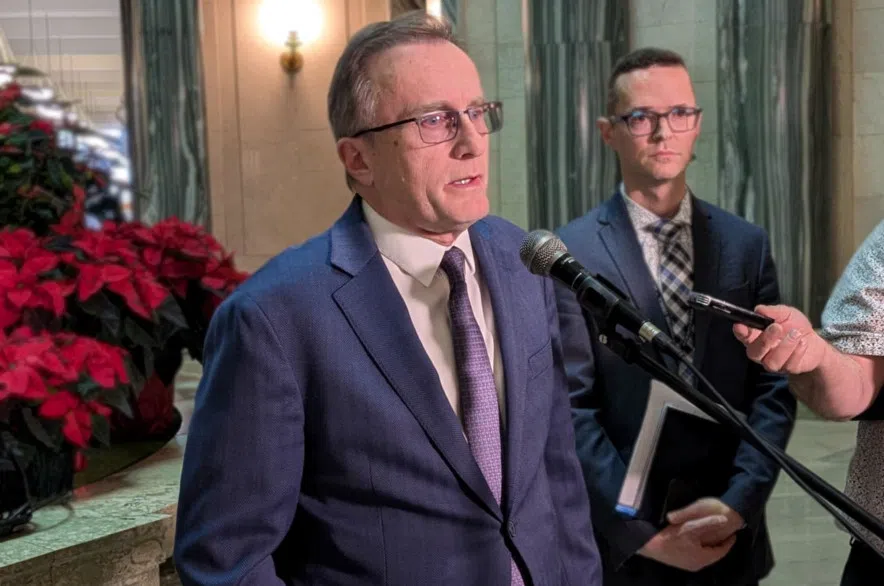On Monday afternoon, the provincial government introduced the Saskatchewan Affordability Act, meant to make life more affordable in the province and keep the Saskatchewan Party’s election promises.
The act would make the necessary changes in legislation for the affordability measures Scott Moe’s Sask. Party promised during the election campaign to come into effect.
“There’s no surprises there,” said Finance Minister Jim Reiter.
Read more:
- Pandemic business loan program lacked ‘value for money’: Auditor
- Record ransomware payment and breach affected thousands in Sask.
The changes would reduce income taxes by increasing the personal exemption as well as the spousal exemption, child exemption and senior supplement over the next four years. They would be increased by $500 a year for the next four years. The bill would also index the income tax brackets and tax credits to keep up with inflation.
The legislation would also increase the low-income tax credit by five per cent each year for the next four years.
In the legislation, the Home Renovation Tax Credit would be re-created — it was first introduced after the 2020 election but ended shortly after.
The new legislation would also increase a number of tax credits: The Saskatchewan First-Time Homebuyers Credit, the Disability Tax Credit and a similar supplement for children with disabilities; the Caregiver Tax Credit would also increase; the Active Families Benefit would rise to $300 per child per year; and the Graduate Retention Program’s tax credit would increase to $24,000 from $20,000.
As well, the legislation would also keep the small business tax rate at one per cent — it was scheduled to go back to two per cent in 2025.
Reiter said the government wants at least some of the measures to be in place by January to start giving people relief on their income taxes.
“We want to get this done as quickly as we can. Obviously, that was big campaign commitment for us, and people want affordability, and we’d like to deliver on that,” said Reiter.
With the fall sitting expected to last only two weeks, the government will have to fast-track the bill and pass it this week.
The government blocked two motions for affordability relief last week from the Saskatchewan NDP — cutting the PST from pre-made groceries and cutting the gas tax — but finance critic Trent Wotherspoon said Monday afternoon the NDP wouldn’t stand in the way of the government’s affordability measures.
“At the end of the day, they’ve been elected with their measures, and we will accept those measures moving forward,” said Wotherspoon.
Reiter said he was sending letters Monday to the federal finance minister and the federal minister responsible for the Canada Revenue Agency. The federal government collects Saskatchewan income tax and then remits it back to the province, so the federal government will have to agree to fast-track these changes for workers in the province to see them on their paycheques starting Jan. 1.
Reiter said he’s optimistic.
“(The federal government) did that with their GST changes just last week, so there’s no reason they can’t do it with with these changes as well,” he said.
Wotherspoon and the NDP have asserted the government’s affordability measures won’t have any tangible effect for more than a year, however Reiter said the Opposition is misinterpreting an explanation he gave last week when he said the changes won’t have an impact on the province’s budget until the 2025-26 fiscal year.
This affordability suite is expected to cost $140 million in the first year, and $310 million a year once all the measures are fully implemented by 2028.

NDP Finance Critic Trent Wotherspoon said on Dec. 2, 2024, the NDP wants more immediate relief for people in the province, including a cut to the PST on prepared foods at the grocery store. (Lisa Schick/980 CJME)
While the NDP won’t stand in the way of the government’s bill, Wotherspoon said it will continue to push for its affordability measures of cutting the gas tax for six months and removing the PST on prepared groceries.
“Saskatchewan, people need relief now — gas and groceries are hitting families’ budgets hard, and we’re calling for that relief,” said Wotherspoon.
Other election promises
There were a number of other election promises the Sask. Party made which would affect people’s pocketbooks, but several aren’t expected to come into effect until the next fiscal year.
Government said increases to the Personal Care Home Benefit, and the earned income amount for the Saskatchewan Assured Income for Disability (SAID) program, won’t be introduced until the 2025-26 budget.
The refundable tax credit toward eligible fertility treatments, the Small and Medium-sized enterprises Investment Tax Credit, and the training rebate for Class 1 commercial drivers’ licences also aren’t expected until the spring budget in several months.
Today, our government will introduce Bill 1 of the new Legislature: The Saskatchewan Affordability Act.
It will deliver on the commitments we made in the recent election campaign to make life more affordable for Saskatchewan people. pic.twitter.com/r6Ux2zj2SA
— Scott Moe (@PremierScottMoe) December 2, 2024
Read more:







